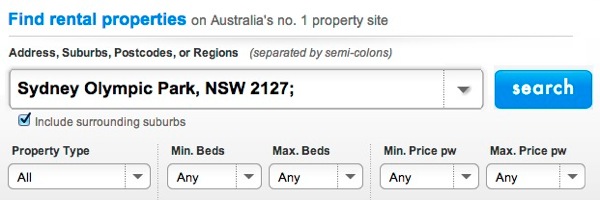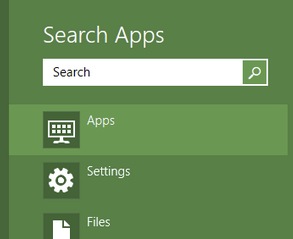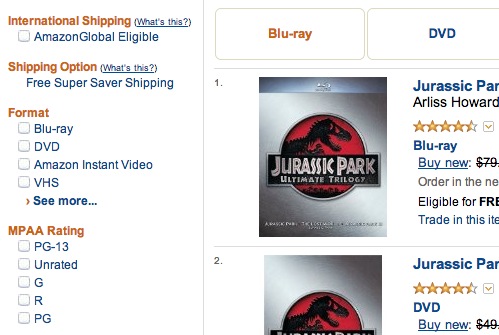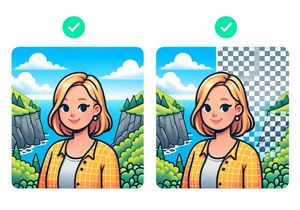Search Boxes – What makes a search, a search?

Hey troops, ever wondered what goes in to designing a search? And I don’t mean the UI of search, I mean how the search should function. Chances are when you’re making an app or website, there is going to be search in there, somewhere. So I thought, lets break down what makes a search, a search.
The Different Types of Search
There are two types – Delimited Search and Incremental Search.
There are only two basic types of search – everything else we are going to talk about in this article, is just an add-on. So what are the two basic types of search? Well, now bare with me because I didn’t come up with these names – we have ‘delimited search’ and ‘incremental search’. Somehow I think those need some explaining.
1. Delimited Search
The delightfully delimited search pattern is one everyone is aware of – you type in some text, press return or click a button, and you see some results. Thats it. Those three steps – the user constructs their search, presses return (or clicks a button) which delimits the search (who comes up with these names), and finally the results display (if their are any).
Delimited Searches wait for the user click ‘search’ or press enter, before searching.
One of the benefits of a delimited search, is you can have a complicated ‘construction’ phase involving ‘scoping’. I’m sure you have used websites with big search forms. The example below from a real estate websites lets you choose property types, number of bedrooms etc with the big ‘search’ button being the delimiter.
So if you want a big complicated search form, you probably want a Delimited Search.
Examples
Delimited Search on Amazon.com

Delimited Search on realestate.com.au

2. Incremental Search
The incredibly incremental search pattern you have no doubt seen a lot. I mean, its what Google does, and most operating systems searches do too.
Incremental Searches search as you type.
Incremental search shows users the results of their search as they type. One of the major benefits of incremental search is that users can stop short of typing the entire word of phrase they were looking for. Incremental search is often used in conjunction with filtering.
Examples
Incremental Search in OSX Finder

Incremental Search in Windows 8

Incremental Search on Google

The Extra Features of Search
1. Search Suggestions
The idea of a search suggestion is simply to suggest possible searches to a user based on what they have already typed. The most common type of search suggestion is ‘autocomplete’. The original purpose of autocomplete was to help people with physical disabilities increase their typing speed, however, now autocomplete is part of most search forms on the web today.
Search suggestions predict a users search query before they finish typing.
So autocomplete shows people some search ‘suggestions’, but where do those suggestions come from? The suggestions often come from a combination of these fabulous four sources:
- The names of items stored in the system. e.g. completing the name of a restaurant on yelp
- Popular searches on the system
- Recent Searches made by a user
- Saved searches made by a user
In fact, recent searches and saved searches are actually proving even more popular in mobile applications than they are on their desktop counterparts. Why you might ask? Think about it, typing on a mobile device is no where near as easy as on the desktop, so anything that can saves you from the terrible trouble of typing is terrific.
Examples
Suggestions in Amazon.com

Suggestions on Google.com

Suggestions in Facebook iOS app

2. Scoping and Filtering
Scoping happens BEFORE you search, and filtering happens AFTER.
Scoping and filtering are two sides of the same coin. Both are about helping the user narrow down the search to find the results they’re looking for. So whats the difference between ’em?? Well scoping happens before you search, and filtering happens after.
Scoping
Lets take Amazon as an example. Amazon presents you with a big search box on the site. On the left of the search box, you can choose the department you want to search in. This is scoping – you are restricting your search to happen to a specific part of the site.

For example, if I was searching for Jurassic Park (which I often am…), and I’d scope my search to ‘Movies and TV’ – I don’t really want to buy another set of Jurassic Park bedsheets.
Filtering
Now the other side of the coin you have the fearless filtering. After I have done my search, for Jurassic Park on Amazon, I can then filter my results to show only Blu Ray DVDs. Filtering helps you refine your search.

So how does scoping and filtering related to the search types? Well filtering is used for both – after all, after a search has run, there is no difference between the two methods. However, scoping, is really only seen with delimited search.
3. Sorting
Sorting, like filtering, is another post search activity. Its about changing the order of the results based on some criteria. It’s pretty straight forward, and you’ve probably seen it on any site where you can buy something.

The Most Famous Example – Google Instant
Firstly, its absolutely amazing. Its so helpful that it actually saves users collectively around 11 million seconds per hour. Thats insane! So how does it work? Well, it combines several different parts of search all together.
Google Instant uses an incremental search, and several sources of search suggestions displayed in the autocomplete style. The incremental search kicks in after the user types in 3 letters, but the autocomplete appears as soon sat he user starts typing.
What really makes Google Instant a killer feature is the suggestions Google makes. They suggest popular searches, recent searches a user has made, as well using recent searches to scope suggestions.

For example, if you enter ‘ring’ into Google while signed in, ‘ringworm’ is the #1 suggestion – yuck! If you then search for ‘Ringo Starr’ and then go back to searching for ‘ring’, ‘Ringo Starr’ is now the #1 suggestion. Pretty amazing.
Conclusion
Well troops, I hope that helps you understand what goes into a search box. If you have any extra ideas, about what makes a search, lets us know in the comments below.


